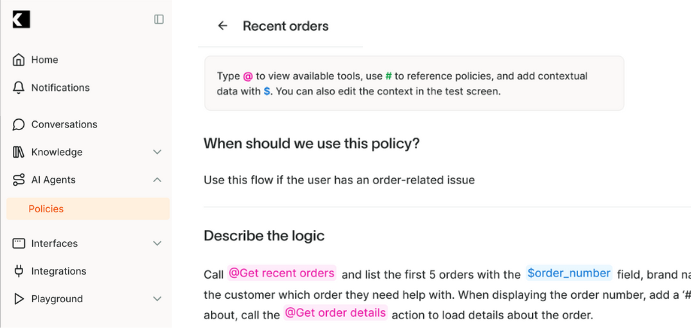Ingredients
The systems used by this policy include ShipMonk, Kustomer, and Kodif.
What are AI Policies?

At Kodif, we’re excited to announce the launch of Policies—a powerful, dynamic solution designed to revolutionize the way CX managers handle customer support. Unlike traditional flows, which are rigid and complex, Policies empower non-technical users to create and manage customer interactions with ease. Written in natural language, Policies make it simple to define and refine customer experiences without needing to rely on complicated flowcharts or scripting. This approach is not only user-friendly but also self-serve, enabling CX teams to quickly translate existing Standard Operating Procedures (SOPs) into automation, saving valuable time and resources.
The flexibility of Kodif Policies ensures that businesses can offer personalized, context-driven support while continuously improving customer experiences. With Policies, you can experiment with different strategies to optimize outcomes such as CSAT, revenue, and retention—all without the need to rebuild complex workflows. Whether it’s automating routine interactions or testing new approaches for high-stakes scenarios, Policies provide a scalable, adaptable solution that aligns with your business goals. While flows still have their place in sensitive, high-risk situations, Policies offer an agile alternative that helps businesses innovate faster and deliver exceptional, tailored experiences at scale.
“WISMO” ticket type explained
“WISMO” stands for “Where Is My Order?” and represents a category of customer inquiries related to the status or location of their orders. In the world of customer support, these tickets are essential as they directly impact customer satisfaction and trust. Customers often reach out with WISMO queries when they are anxious about delivery times, need tracking information, or have concerns about potential shipping delays. Efficient handling of WISMO tickets can greatly enhance a customer’s experience, ensuring they remain informed and reassured about their purchase.
Which Platforms does this AI policy work on?
This AI policy is designed to work seamlessly on ShipMonk, Kustomer, and Kodif. Moreover, Kodif offers integration capabilities with all other major platforms, ensuring a broad and flexible application across various customer support systems.
When should I use this policy?
Use this policy when customers want to know the status of their orders. The logic behind implementing this policy involves a few straightforward steps:
- Ask for the user’s email address
- Use @get_kustomer_account_details to check if the user with that email address exists in Kustomer.
- If the email address was not found, ask for a valid email address.
-
If the email address is still not found, route it to an agent for further investigation.
-
Display Recent Orders:
- Use @get_shipmonk_orders to retrieve the user’s recent orders.
- Display the list of recent orders and ask the user which specific order they would like to inquire about.
-
If the order was not found, route to an agent for further investigation.
-
Check Order Status
- For the selected order, retrieve the shipping status using @shipmonk_order_details(order_id: str).
- If “Approved”, inform the customer that the order was approved and is awaiting processing.
- If “Processing”, inform that the order was processed and is waiting to be shipped.
- If “Pending Shipment”, inform that the order is pending shipment and provide a shipment date.
- If “Shipped”, inform that the order was shipped and is waiting to be in transit and provide the tracking number.
- If “In transit”, use @shipmonk_order_details to check if the order is within the estimated delivery date. If yes, inform the order is in transit and provide the expected delivery date. If no, inform the customer that the route is delayed and that the request will be transferred to an agent for investigation.
- If “Delivered”, confirm with the customer if the order was delivered. If not delivered, route to an agent or create a ticket to escalate for further investigation.
- If “Canceled”, inform that the order was already canceled.
Policy logic
When should we use this policy? Use this policy when customers want to know the status of their orders. The logic behind implementing this policy involves a few straightforward steps:
- Ask for the user’s email address
- Use @get_kustomer_account_details to check if the user with that email address exists in Kustomer.
- If the email address was not found, ask for a valid email address.
-
If the email address is still not found, route it to an agent for further investigation.
-
Display Recent Orders:
- Use @get_shipmonk_orders to retrieve the user’s recent orders.
- Display the list of recent orders and ask the user which specific order they would like to inquire about.
-
If the order was not found, route to an agent for further investigation.
-
Check Order Status
- For the selected order, retrieve the shipping status using @shipmonk_order_details(order_id: str).
- If “Approved”, inform the customer that the order was approved and is awaiting processing.
- If “Processing”, inform that the order was processed and is waiting to be shipped.
- If “Pending Shipment”, inform that the order is pending shipment and provide a shipment date.
- If “Shipped”, inform that the order was shipped and is waiting to be in transit and provide the tracking number.
- If “In transit”, use @shipmonk_order_details to check if the order is within the estimated delivery date. If yes, inform the order is in transit and provide the expected delivery date. If no, inform the customer that the route is delayed and that the request will be transferred to an agent for investigation.
- If “Delivered”, confirm with the customer if the order was delivered. If not delivered, route to an agent or create a ticket to escalate for further investigation.
- If “Canceled”, inform that the order was already canceled.
Example policy
When should we use this policy? Use this policy when customers want to know the status of their orders. The logic behind implementing this policy involves a few straightforward steps:
- Ask for the user’s email address
- Use @get_kustomer_account_details to check if the user with that email address exists in Kustomer.
- If the email address was not found, ask for a valid email address.
-
If the email address is still not found, route it to an agent for further investigation.
-
Display Recent Orders:
- Use @get_shipmonk_orders to retrieve the user’s recent orders.
- Display the list of recent orders and ask the user which specific order they would like to inquire about.
-
If the order was not found, route to an agent for further investigation.
-
Check Order Status
- For the selected order, retrieve the shipping status using @shipmonk_order_details(order_id: str).
- If “Approved”, inform the customer that the order was approved and is awaiting processing.
- If “Processing”, inform that the order was processed and is waiting to be shipped.
- If “Pending Shipment”, inform that the order is pending shipment and provide a shipment date.
- If “Shipped”, inform that the order was shipped and is waiting to be in transit and provide the tracking number.
- If “In transit”, use @shipmonk_order_details to check if the order is within the estimated delivery date. If yes, inform the order is in transit and provide the expected delivery date. If no, inform the customer that the route is delayed and that the request will be transferred to an agent for investigation.
- If “Delivered”, confirm with the customer if the order was delivered. If not delivered, route to an agent or create a ticket to escalate for further investigation.
- If “Canceled”, inform that the order was already canceled.


